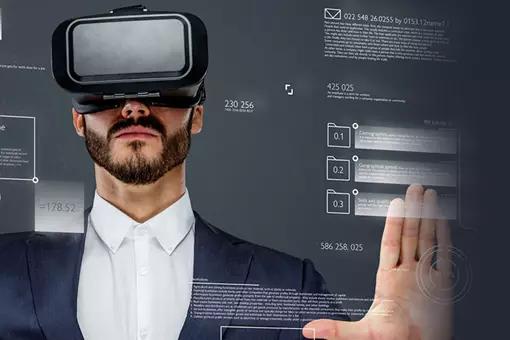The Future Of Edtech: Trends And Expert Insights
- 22nd August 2025
- Written by LSBF Staff
- Innovation & Technology

Educational technology (EdTech) is rapidly transforming the global learning landscape; the integration of technology in education is a fundamental driver of progress, equipping professionals to lead through disruption and foster transformative growth.
LSBF leverages EdTech to offer flexible, accessible, and highly interactive learning experiences, integrating advanced technologies like VR and live online collaboration to prepare its diverse student body for global business challenges.
What Is EdTech?
EdTech, short for educational technology, applies technological tools to improve learning and teaching. It encompasses diverse digital solutions, from learning management systems to AI-powered tutoring. Essentially, educational technology aims to make learning more accessible, engaging, and effective.
Why EdTech Innovation Matters?
EdTech innovation is crucial as it meets evolving learner needs and prepares individuals for a changing world. EdTech companies drive solutions that overcome educational barriers and foster new skills. The profound EdTech impact is seen in improved outcomes, increased access, and enhanced experiences.
Benefits of EdTech for Students
Personalised Learning:
- EdTech platforms adapt to individual styles, offering tailored content.
Increased Engagement:
- Interactive tools and multimedia make learning dynamic and enjoyable.
Accessibility:
- Digital resources expand learning opportunities for all, including remote or special needs students.
Skill Development:
- Students gain vital digital literacy and critical thinking.
Upskill with LSBF Courses Today
Benefits of EdTech for Teachers
Streamlined Administration:
- Automation of tasks like marking and record-keeping frees up time for teaching.
Enhanced Instruction:
- Access to diverse digital resources improves lesson planning.
Data-Driven Insights:
- Learning analytics provide data on student performance, enabling targeted support.
Professional Development:
Key EdTech Trends and Expert Insights
The future of EdTech is shaped by continuous innovation. Keeping abreast of EdTech news is vital for predicting advancements in the EdTech industry.
- Artificial Intelligence in Education:
AI offers adaptive learning, intelligent tutoring, and automated feedback for personalised pathways. - Virtual Reality and Augmented Reality:
VR/AR create immersive learning environments, allowing students to explore complex concepts, conduct virtual experiments, and go on virtual field trips, enhancing engagement and understanding. - Gamification in Education:
Integrating game-like elements (points, badges, leaderboards) motivates learners and fosters problem-solving, by making education fun and interactive. - Advanced Personalised and Adaptive Learning:
Leveraging AI and data creates highly individualised learning paths adjusting in real-time. - Blockchain Technology in Education:
Blockchain is a secure, shared digital record that continuously links information in unchangeable "blocks" across a network, removing the need for a central authority. Emerging uses include secure digital credentials and streamlined administration. - Hybrid and Flexible Learning Models:
Blended learning combines in-person and online instruction, aiding flexibility. - Growth of Microlearning:
Short, focused content bursts delivered on-demand cater to busy schedules and continuous skill acquisition. - Immersive Learning:
Extending beyond VR/AR, this involves highly interactive simulations for deeper understanding and practical skill development. - Integration of Social Learning Platforms:
These platforms facilitate collaboration and community building, recognising social interaction's power in learning. - Use of Datafication and Learning Analytics: Analysing learning data helps educators understand performance and optimise learning strategies.
EdTech: Challenges, Opportunities and What’s Next?
The EdTech industry presents immense opportunities but also challenges. Ensuring equitable access, addressing digital divides, safeguarding student data and providing teacher training are critical hurdles. However, these challenges also drive EdTech business to innovate for inclusivity, security, and effective integration of educational technology in education.
FAQs
Q: How are universities integrating EdTech into their curricula?
A: Universities use EdTech through online courses, blended learning, virtual labs, AI-powered tools, and digital assessments, supported by robust learning management systems.
Q: How is artificial intelligence transforming EdTech?
A: AI in EdTech enables personalised adaptive learning, intelligent tutoring, automated grading, and predictive analytics to support students.
Q: How secure are EdTech platforms for student data?
A: Reputable EdTech companies prioritise data privacy via encryption, compliance with regulations (GDPR, FERPA), and clear data usage policies. Always check privacy statements.
Q: What is personalised learning and how is it implemented in EdTech?
A: Personalised learning, enabled by EdTech, tailors education to individual needs. It's implemented through adaptive software, AI tutors, and self-paced platforms that adjust content dynamically.
Q: What expert predictions shape the future of EdTech globally?
A: Expert predictions for the future of EdTech emphasise AI, immersive tech, flexible learning, lifelong skills, and data analytics for more equitable and accessible education globally.
The future of EdTech will likely see continued AI advancements, more sophisticated immersive experiences, and a greater emphasis on lifelong and skills-based learning. Expect seamless integration of technology in education, making learning an inherent part of daily life. Find out how LSBF harnesses EdTech in practical digital skills and industry relevance, ensuring global accessibility and an enhanced learning journey.
Image Credit: Freepik
Other News
The Role of Technology in Modern Finance Education
Today, financial education must mirror the technological Reality of the industry. At institutions like the London School of Business &…
How Virtual Reality Is Transforming Business Education
Virtual reality in education is no longer a futuristic concept; it is a practical tool. It provides a fully immersive…
How Us Tariff Announcements Are Shaping Global Markets
Recent US tariff announcements have sent shockwaves across the global economy, becoming a dominant factor in international trade discussions. Understanding…




